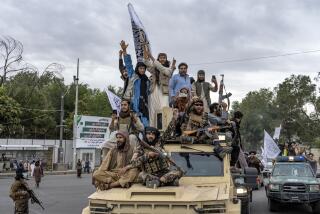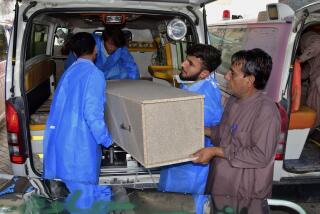Gunmen seize 30 Hazara men in Afghanistan, officials say
Masked gunmen abducted 30 members of Afghanistan’s ethnic Hazara minority who were traveling along a dangerous highway from the south, local authorities said Tuesday.
The bus was traveling from the southern city of Kandahar to Kabul, the capital, through Shajoy district of Zabul province late Monday when it was stopped by gunmen, district police chief Mohammad Ullah Ahmadi told local media.
The 30 men taken -- women and children were reportedly spared -- were said to be Afghan refugees returning from Iran. Though officials released few other details, local sources said all 30 were members of the Hazara minority, a predominantly Shiite Muslim group.
The kidnappings mark the first instance of Hazaras being targeted since 14 people were gunned down while traveling through the central province of Ghor last summer. As with Monday’s abductions, the July killings saw civilians traveling by bus being divided and separated based on ethnicity and religion.
No one took immediate responsibility for the latest abductions.
There were conflicting reports about whether the latest kidnappings were carried out by fighters tied to Islamic State. The district governor blamed the militant group, though the police commander of Zabul province said the district borders Pakistan and that there is a good chance that the gunmen were from that country and took their victims back across the border.
Though still considered a relatively small movement in Afghanistan, Islamic State has recently been making news in the Central Asian nation.
On Monday, local officials reported the burnings of a shrine and several homes in Charkh district of Logar province by a group said to be loyal to Islamic State, which is largely based in areas of Iraq and Syria.
The interpretation of Islam espoused by Islamic State -- which includes a strong anti-Shiite stance -- is considered much more hard-line than the Islamic faith commonly practiced in Afghanistan.
Abdul Matin Amiri, an Afghan journalist based in the southern province of Kandahar who has been investigating reports of Islamic State presence in the country, said security officials in the south have yet to find credible evidence of a large force tied to the militant group, which is also known as Daesh.
“They have heard the reports too, but they say so far there is nothing to prove that it is a large or legitimate threat in the country,” Amiri said. “Even when they capture fighters at the scenes of battles said to be orchestrated by Daesh, they have yet to see anything that clearly proves they are part of the group.”
Compared with Iraq and neighboring Pakistan, sectarianism historically has not been as serious an issue in Afghanistan. Even the Taliban militants -- who were said to have targeted the Shiites, especially Hazaras, during their five-year reign -- have taken a much less sectarian stance in recent years.
In 2011, the group denounced what was seen as the first large-scale sectarian assault in the nation. That attack, carried out by the Pakistani group Lashkar-e Jhangvi, saw dozens of worshipers in Kabul killed in a suicide bombing targeting processions for Shiite rites of Ashura. The Afghan Taliban condemned that attack for leaving “defenseless countrymen ... soaked in their blood and their families left in utter grief.”
However, some Hazaras -- who make up the majority of the nation’s Shiite population, estimated at just over 20% -- say there have been recent efforts to incite sectarian division in the nation.
Abdul Ghafoor, a Kabul resident who spent more than two decades in neighboring Pakistan, said recent campaigns have targeted Kartei Seh, a predominantly Hazara neighborhood of Kabul.
“A leaflet espousing anti-Shia ideas that was distributed in west Kabul has been widely circulated on social media” in recent days, Ghafoor said.
Latifi is a special correspondent.
More to Read
Sign up for Essential California
The most important California stories and recommendations in your inbox every morning.
You may occasionally receive promotional content from the Los Angeles Times.










